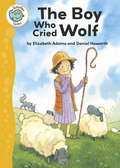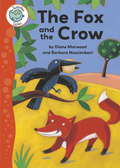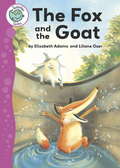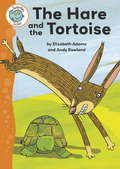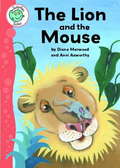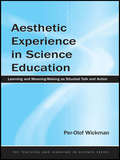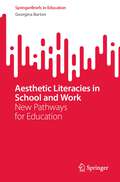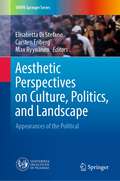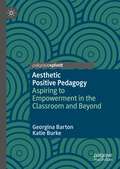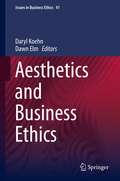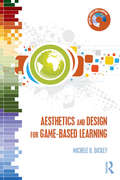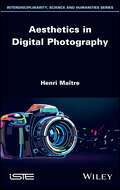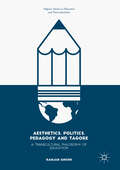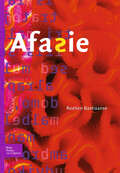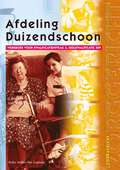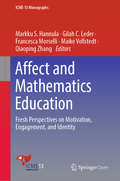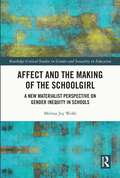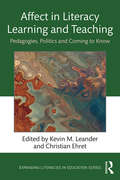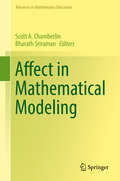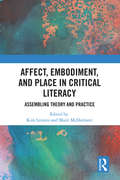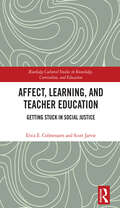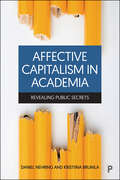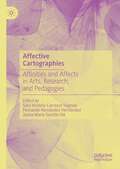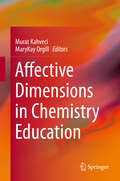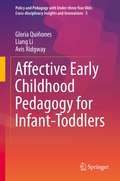- Table View
- List View
Aesop's Fables: The Boy Who Cried Wolf (Tadpoles Tales #14)
by Elizabeth AdamsA simple retelling of a favourite Aesop fable. Whenever the shepherd boy gets bored, he shouts, 'Wolf!' and everybody runs to help. But, one day, a real wolf comes ...
Aesop's Fables: The Fox and the Crow (Tadpoles Tales #15)
by Diane MarwoodA simple retelling of a favourite Aesop fable. Crow has some food, and Fox wants it! Can he think of a clever plan to make Crow drop the food?
Aesop's Fables: The Fox and the Goat (Tadpoles Tales #16)
by Elizabeth AdamsA simple retelling of a favourite Aesop fable. Fox is trapped in a well and he tricks Goat into joining him. But can he trick Goat again to get out?
Aesop's Fables: The Hare and the Tortoise (Tadpoles Tales #17)
by Elizabeth AdamsA simple retelling of a favourite Aesop fable. Hare thinks he is much quicker than Tortoise and never stops teasing her. But what will happen when they have a race?
Aesop's Fables: The Lion and the Mouse (Tadpoles Tales #18)
by Diane MarwoodA simple retelling of a favourite Aesop fable. Mouse is in big trouble when he wakes Lion up... but one day, Lion might need Mouse's help!
Aesthetic Experience in Science Education: Learning and Meaning-Making as Situated Talk and Action (Teaching and Learning in Science Series)
by Per-Olof WickmanThis book examines the role of aesthetic experience in learning science and in science education from the perspective of knowledge as action and language use. The theoretical underpinnings are based on the writings of John Dewey and Ludwig Wittgenstein. In their spirit aesthetics is examined as it appears in the lives of people and how it relates to the activities in which they are involved.Centered around an empirical analysis of how students and their teachers use aesthetic language and acts during laboratory and field work, the book demonstrates that aesthetics is something that is constantly talked about in science class and that these aesthetic experiences are intimately involved in learning science. These empirical findings are related to current debates about the relation between aesthetics and science, and about motivation, participation, learning and socio-cultural issues in science education. This book features:*an empirical demonstration of the importance and specific roles of aesthetic experiences in learning science;*a novel contribution to the current debate on how to understand motivation, participation and learning; and*a new methodology of studying learning in action.Part I sketches out the theoretical concepts of Wickman's practical epistemology analysis of the fundamental role of aesthetics in science and science education. Part II develops these concepts through an analysis of the use of aesthetic judgments when students and teachers are talking in university science classes. Part III sums up the general implications of the theoretical underpinnings and empirical findings for teaching and learning science. Here Wickman expands the findings of his study beyond the university setting to K-8 school science, and explicates what it would mean to make science education more aesthetically meaningful.Wickman's conclusions deal to a large extent with aesthetic experience as individual transformation and with people's prospects for participation in an activity such as science education. These conclusions have significance beyond science teaching and learning that should be of concern to educators generally. This book is intended for educational researchers, graduate students, and teacher educators in science education internationally, as well as those interested in aesthetics, philosophy of education, discourse analysis, socio-cultural issues, motivation, learning and meaning-making more generally.
Aesthetic Literacies in School and Work: New Pathways for Education (SpringerBriefs in Education)
by Georgina BartonThis book argues the importance of aesthetic literacies in learning and teaching in schools for future work. The study of aesthetics is critical in today’s learning, due to the increasingly complex ways in which we communicate meaning, such as through the presentation of texts and objects. The book provides educators, pre-service teachers, and students an in-depth understanding of aesthetic literacies in innovative spaces, including in philosophical literature, environmental spaces, curricula and classrooms. Using various theoretical frames from both the arts and literacy fields, this book shares relevant pedagogies, theorisations and contexts where aesthetic literacies are at the core of learning. It emphasises how improved knowledge of aesthetics and quality experiences in beauty are vital in aiding students and young children develop the necessary resilience and tolerance needed in today’s uncertain world.
Aesthetic Perspectives on Culture, Politics, and Landscape: Appearances of the Political (UNIPA Springer Series)
by Max Ryynänen Elisabetta Di Stefano Carsten FribergThis book investigates how we are involved in politically informed structures and how they appear to us. Following different approaches in contemporary aesthetics and cultural philosophy, such as everyday aesthetics, atmosphere and aestheticization, the contributions explore how embedded powers in politics, education, democracy, and landscape are analyzed through aesthetics.
Aesthetic Positive Pedagogy: Aspiring to Empowerment in the Classroom and Beyond
by Georgina Barton Katie BurkeThis book introduces and explores a new pedagogical approach, Aesthetic Positive Pedagogy (APP), for teachers and students in a variety of educational contexts. The book is built on the need for educational institutions and communities to seriously consider a strong positive approach to learning and teaching, ultimately leading to a better world. Based on pre-existing philosophies such as positive pedagogy and critical pedagogy, APP encourages teachers to carefully consider their language use as well as other modal resources in the classroom. Using aesthetic experience as a core to learning, teachers can embed an approach to learning and teaching that supports wellbeing and resilience as well as caring and compassionate citizenship in their students. The authors outline what an APP approach to learning and teaching looks, feels and sounds like in different educational contexts such as in schools and higher education, and explore how it might be implemented in face-to-face as well as online learning. The book’s findings will apply to postgraduate students and academics in education and the creative arts, as well as teachers and leaders in schools.
Aesthetics and Business Ethics (Issues in Business Ethics #41)
by Daryl Koehn Dawn ElmLudwig Wittgenstein famously said, "Ethics is aesthetics." It is unclear what such a claim might mean and whether it is true. This book explores contentious issues arising at the interface of ethics and aesthetics. The contributions reflect on the status of aesthetic en ethical judgments, the relation of aesthetic beauty and ethical goodness and art and character development. The book further considers the potential role art could play in ethical analysis and in the classroom and explores in what respects aesthetics and ethics might be intertwined and even mutually supportive.
Aesthetics and Design for Game-based Learning (Digital Games, Simulations, and Learning)
by Michele D. DickeyAesthetics and Design for Game-based Learning provides learning designers with insight into how the different elements that comprise game aesthetics can inform the design of game-based learning. Regardless of the cognitive complexities involved, games are essentially entertainment media, and aesthetics play a large role in how they are experienced. Yet too often the role of aesthetics in the research about game-based learning has been relegated to a surface discussion of graphics or neglected altogether. Aesthetics and Design for Game-based Learning begins by addressing the broad context of game aesthetics, then addresses specific elements with chapters focusing on: player positioning game mechanics narrative design environment design character design. Each chapter includes research and guidelines for design, and a conclusion addresses aesthetics in the research of game-based learning.
Aesthetics in Digital Photography
by Henri MaîtreAutomatically evaluating the aesthetic qualities of a photograph is a current challenge for artificial intelligence technologies, yet it is also an opportunity to open up new economic and social possibilities.Aesthetics in Digital Photography presents theories developed over the last 25 centuries by philosophers and art critics, who have sometimes been governed by the objectivity of perception, and other times, of course, by the subjectivity of human judgement. It explores the advances that have been made in neuro-aesthetics and their current limitations.In the field of photography, this book puts aesthetic hypotheses up against experimental verification, and then critically examines attempts to “scientifically” measure this beauty. Special attention is paid to artificial intelligence techniques, taking advantage of machine learning methods and large databases.
Aesthetics, Politics, Pedagogy and Tagore: A Transcultural Philosophy of Education (Palgrave Studies in Education and Transculturalism)
by Ranjan GhoshThis book provides a radical rethinking of the prominent Indian thinker Rabindranath Tagore, exploring how his philosophy of education relates to the ideas of Western theorists such as Kant, Plato and Aristotle. Tagore's thoughts on pedagogy, university and formal education are subjected to a fascinating critique within Ghosh's transcultural framework, referencing a wide range of thinkers across varying time periods, places, and cultures, and developing a greater sensitivity to other traditions, languages, and forms of thinking and writing. The book changes the way we have so far thought about the educationist Tagore, and will be of interest to scholars and specialists of literature, Indian history, and philosophy of education. It is political, deeply philosophical and has a transcultural take on our understanding of a variety of issues relating to Tagore and to philosophy of education in general.
Afasie
by Roelien BastiaanseAfasie is een taalstoornis ten gevolge van hersenletsel, bijvoorbeeld na een beroerte. Iemand die lijdt aan afasie kan niet meer normaal over zijn taalvermogen beschikken en zal daardoor communicatieproblemen ondervinden die niet alleen grote gevolgen hebben voor de patiënt zelf, maar ook voor zijn omgeving. Verschillende disciplines hebben te maken met afasie. Logopedisten en klinisch linguïsten zijn verantwoordelijk voor de diagnostiek en de therapie. Neurologen en revalidatie-artsen zullen niet zelden patiënten zien die aan afasie lijden. Afasie biedt echter ook een blik op de taalverwerkingsprocessen in de hersenen en wordt als zodanig bestudeerd door neurolinguïsten en neuropsychologen. Zij analyseren wat de patiënten wel en niet kunnen en proberen daar patronen in te ontdekken. Zo willen zij inzicht krijgen in de representatie van taal in de hersenen. In dit boek worden de oorzaken van afasie, de symptomen en de afasiesyndromen beschreven. Ook wordt er een historisch beeld geschetst van de ontwikkeling van het vakgebied en komen wetenschappelijke ontwikkelingen aan bod. Een samenhangend overzicht wordt gegeven van het klinische en wetenschappelijke onderzoek naar afasie.
Afdeling Duizendschoon: Werkboek voor kwalificatieniveau 3, deelkwalificatie 309 (Zorggericht)
by J. Korhorn W. Vries-PrinsZorgcategorie: Geriatrische zorgvrager Setting: WoonzorgcentrumKorte inhoud: De afdeling Duizendschoon is een afdeling in een verpleeghuis. De bewoners hebben psychogeriatrische problemen. Ze kunnen niet meer thuis wonen. Bij een blijvende opname wordt de woning verkocht of de huur opgezegd en alle eigendommen en meubels worden door de familie weggedaan. De verpleegafdeling is echt de laatste woonplaats. De mensen die op een psychogeriatrische afdeling in dit verpleeg- huis wonen delen hun kamer met drie andere mensen. Het enige dat zij nog voor zichzelf hebben is een bed, een kledingkast en een nachtkastje. En daarvan kunnen zij niet onthouden dat het van hen is, als ze dement zijn.
Affect and Mathematics Education: Fresh Perspectives on Motivation, Engagement, and Identity (ICME-13 Monographs)
by Markku S. Hannula Qiaoping Zhang Francesca Morselli Gilah C. Leder Maike VollstedtThis open access book, inspired by the ICME 13 topic study group “Affect, beliefs and identity in mathematics education”, presents the latest trends in research in the area. Following an introduction and a survey chapter providing a concise overview of the state-of-art in the field of mathematics-related affect, the book is divided into three main sections: motivation and values, engagement, and identity in mathematics education. Each section comprises several independent chapters based on original research, as well as a reflective commentary by an expert in the area. Collectively, the chapters present a rich methodological spectrum, from narrative analysis to structural equation modelling. In the final chapter, the editors look ahead to future directions in the area of mathematics-education-related affect.It is a timely resource for all those interested in the interaction between affect and mathematics education.
Affect and the Making of the Schoolgirl: A New Materialist Perspective on Gender Inequity in Schools (Routledge Critical Studies in Gender and Sexuality in Education)
by Melissa Joy WolfeBy exploring the material-discursive production of gender norms in Australian secondary schools, this book offers a novel feminist posthuman new materialist perspective on how schoolgirls are pre-determined within educational space and place. The text ultimately illustrates how gender and race inequity is reproduced through presumptive thinking and a failure to recognize student potential. Affect and the Making of the Schoolgirl maps affective accounts of students’ everyday experiences in school spaces. Student negotiations with prescriptive processes of subject participation and subject selection are explored to illustrate how inequities are systematically reproduced. Chapters also offer an examination of STEM subject fields as entitled male space. Engaging theoretically with concepts from performative feminist new materialism and affect theory, the text highlights filmic semblances created as part of an onto-epistemological project, and calls for alternative educational encounters which affirmatively acknowledge difference and promote non-binary thinking. This text will benefit postgraduate researchers, academics, and scholars with an interest in gender and sexuality education, teacher education, STEM education, gender inequality, intersectionality, and the sociology of education. Those interested in gender studies, affect theory and feminist theory, as well as educational policy and politics more broadly will also benefit from this book.
Affect in Literacy Learning and Teaching: Pedagogies, Politics and Coming to Know (Expanding Literacies in Education)
by Kevin M. Leander Christian EhretIn this cutting-edge volume, scholars from around the world connect affect theory to the field of literacy studies and unpack the role and influence of this emerging area of scholarship on literacy education. Offering an introduction to affect theory and scholarship as it relates to literacy studies, contributors discuss the role of humanizing and dehumanizing influences on schooling and examine the emotional and affective dimensions at individual and communal levels. Arguing that an affective turn requires a radical rethinking of the nature of literacy, these chapters address the impact and import of emotion and affect on reading, writing and calling to action. Grounded in trailblazing research, the contributors push the boundaries of academic writing and model how theoretically-driven writing about affect must itself be moving and expressive.
Affect in Mathematical Modeling (Advances in Mathematics Education)
by Bharath Sriraman Scott A. ChamberlinIn the book, the relationship between affect and modeling is discussed because, as educational psychologists have suggested for decades, affect directly influences achievement. Moreover, given the importance of mathematical modeling and the applications to high level mathematics, it provides the field of mathematics psychology with insight regarding affect, in relation to mathematical modeling. By doing so it helps determine the degree to which understanding of mathematics and understanding affect in mathematical modeling episodes may have a direct effect on cognition.
Affect, Embodiment, and Place in Critical Literacy: Assembling Theory and Practice (Routledge Research in Education)
by Kim Lenters Mairi McDermottThis book explores the impact of sensation, affect, ethics, and place on literacy learning from early childhood through to adult education. Chapters bridge the divide between theory and practice to consider how contemporary teaching and learning can promote posthuman values and perspectives. By offering a posthuman approach to literacy research and pedagogy, Affect, Embodiment, and Place in Critical Literacy re-works the theory-practice divide in literacy education, to emphasize the ways in which learning is an affective and embodied process merging in a particular environment. Written by literacy educators and international literacy researchers, this volume is divided into four sections focussing on: Moving with sensation and affect; becoming worldmakers with ethics and difference; relationships that matter in curriculum and place; before drawing together everything in a concise conclusion. Affect, Embodiment, and Place in Critical Literacy is the perfect resource for researchers, academics, and postgraduate students in the fields of literacy education and philosophy of education, as well as those seeking to explore the benefits of a posthumanism approach when conceptualising theory and practice in literacy education.
Affect, Learning, and Teacher Education: Getting Stuck in Social Justice (Routledge Cultural Studies in Knowledge, Curriculum, and Education)
by Erica E. Colmenares Scott JarvieThis volume inquires into student teachers’ “stuck moments”—moments of felt crisis—as they occur within the context of a university-based social justice teacher education (SJTE) program. The book complicates the notion that these stuck moments are primarily effects of a gap between theory and practice. Instead, Colmenares and Jarvie argue for a more robust conceptualization, drawing on affect theory, posthumanism, and Deleuzian scholarship. By considering what stuck moments do, and do to, student teachers, the book reimagines SJTE in ways that are both responsive to stuckness and disruptive of discourses of learning that dominate the field. Through a critique of the affective workings of learning, the authors consider how these discourses can prove counterproductive for the work of teaching for social justice. This insightful and stimulating volume will be of use to scholars, researchers, and students with interests in curriculum studies, affective approaches to education and SJTE.
Affective Capitalism in Academia: Revealing Public Secrets
by Daniel Nehring and Kristiina BrunilaDrawing on affect theory and research on academic capitalism, this book examines the contemporary crisis of universities. Moving through 11 international and comparative case studies, it explores diverse features of contemporary academic life, from the coloniality of academic capitalism to performance management and the experience of being performance-managed. Affect has emerged as a major analytical lens of social research. However, it is rarely applied to universities and their marketisation. Offering a unique exploration of the contemporary role of affect in academic labour and the organisation of scholarship, this book considers modes of subjectivation, professional and personal relationships and organisational structures and their affective charges. Chapter 9 is available Open Access via OAPEN under CC-BY-NC-ND licence.
Affective Cartographies: Affinities and Affects in Arts, Research, and Pedagogies
by Sara Victoria Carrasco Segovia Fernando Hernández Hernández Juana María Sancho-GilThis book focuses on cartographies as epistemology and visual strategy, highlighting three major axes: corporeal, affective, and nomadic learning. Based on the onto-episte-methodological and ethical displacement from reductive approaches, the book emphasizes new ways of understanding arts, research, teaching and learning processes at the university and beyond. Contributions highlight practices focused on dialogue, sharing, readings and philosophical discussions which allow educators to move away from what is typically thought of as ‘correct’, and reinforce the importance of a decolonized approach to learning and knowledge, understanding the (re)search process as an imperfect journey in becoming.
Affective Dimensions in Chemistry Education
by Murat Kahveci Marykay OrgillThis is a unique resource for those wishing to address the affective domain as they research and solve problems in chemistry education. Contributions by world-leading experts cover both fundamental considerations and practical case studies. This work fills a gap in the literature of chemistry education, which so far has focussed mainly on the cognitive domain. The affective domain refers to feelings-based constructs such as attitudes, values, beliefs, opinions, emotions, interests, motivation, and a degree of acceptance or rejection. It can affect students' interest in science topics and their motivation to persevere in learning science concepts.
Affective Early Childhood Pedagogy for Infant-Toddlers (Policy and Pedagogy with Under-three Year Olds: Cross-disciplinary Insights and Innovations #3)
by Avis Ridgway Gloria Quiñones Liang LiThis exciting new book brings fresh knowledge of affective pedagogies in early childhood education and care. The book draws on cultural-historical theory in alignment with visual methodologies to elucidate infant-toddlers’ affective pedagogies through analysis of case examples. The book reveals contemporary pedagogical practices in the infant-toddler space like mealtimes, nappy change and play. These pedagogical practices show the highly specialised nature of working with infant-toddlers such as the affective relations between educators and infant-toddlers, affective dialogue, affective engagement, and the creation of affective spaces. The value of collaboration is highlighted through creating an affective space for educators to become aware, reflect and position themselves as effective and affective educators. The book introduces innovative methodological tools such as images and collective drawings for collaborative reflection.
